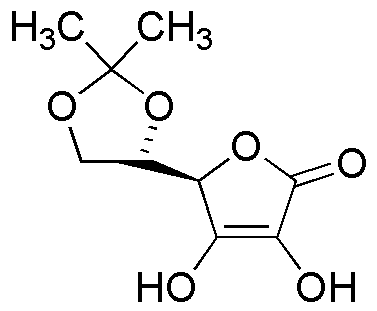L-Ascorbic acid acetonide is widely utilized in research focused on:
- Cosmetic Formulations: This compound serves as a stable derivative of vitamin C, enhancing skin care products by providing antioxidant properties and promoting collagen synthesis, which helps in reducing signs of aging.
- Pharmaceutical Applications: It is used in drug formulations for its potential to improve the bioavailability of active ingredients, making medications more effective in treating various conditions.
- Food Preservation: As a food additive, it helps in preventing oxidation, thereby extending the shelf life of products while maintaining nutritional quality, especially in processed foods.
- Research in Antioxidant Studies: This compound is a key focus in studies exploring the effects of antioxidants on health, providing insights into its role in preventing oxidative stress-related diseases.
- Analytical Chemistry: L-Ascorbic acid acetonide is employed as a standard in various analytical techniques, aiding in the quantification of vitamin C in different matrices, which is crucial for quality control in food and pharmaceutical industries.
General Information
Properties
Safety and Regulations
Applications
L-Ascorbic acid acetonide is widely utilized in research focused on:
- Cosmetic Formulations: This compound serves as a stable derivative of vitamin C, enhancing skin care products by providing antioxidant properties and promoting collagen synthesis, which helps in reducing signs of aging.
- Pharmaceutical Applications: It is used in drug formulations for its potential to improve the bioavailability of active ingredients, making medications more effective in treating various conditions.
- Food Preservation: As a food additive, it helps in preventing oxidation, thereby extending the shelf life of products while maintaining nutritional quality, especially in processed foods.
- Research in Antioxidant Studies: This compound is a key focus in studies exploring the effects of antioxidants on health, providing insights into its role in preventing oxidative stress-related diseases.
- Analytical Chemistry: L-Ascorbic acid acetonide is employed as a standard in various analytical techniques, aiding in the quantification of vitamin C in different matrices, which is crucial for quality control in food and pharmaceutical industries.
Documents
Safety Data Sheets (SDS)
The SDS provides comprehensive safety information on handling, storage, and disposal of the product.
Product Specification (PS)
The PS provides a comprehensive breakdown of the product’s properties, including chemical composition, physical state, purity, and storage requirements. It also details acceptable quality ranges and the product's intended applications.
Certificates of Analysis (COA)
Search for Certificates of Analysis (COA) by entering the products Lot Number. Lot and Batch Numbers can be found on a product’s label following the words ‘Lot’ or ‘Batch’.
*Catalog Number
*Lot Number
Certificates Of Origin (COO)
This COO confirms the country where the product was manufactured, and also details the materials and components used in it and whether it is derived from natural, synthetic, or other specific sources. This certificate may be required for customs, trade, and regulatory compliance.
*Catalog Number
*Lot Number
Safety Data Sheets (SDS)
The SDS provides comprehensive safety information on handling, storage, and disposal of the product.
DownloadProduct Specification (PS)
The PS provides a comprehensive breakdown of the product’s properties, including chemical composition, physical state, purity, and storage requirements. It also details acceptable quality ranges and the product's intended applications.
DownloadCertificates of Analysis (COA)
Search for Certificates of Analysis (COA) by entering the products Lot Number. Lot and Batch Numbers can be found on a product’s label following the words ‘Lot’ or ‘Batch’.
*Catalog Number
*Lot Number
Certificates Of Origin (COO)
This COO confirms the country where the product was manufactured, and also details the materials and components used in it and whether it is derived from natural, synthetic, or other specific sources. This certificate may be required for customs, trade, and regulatory compliance.


